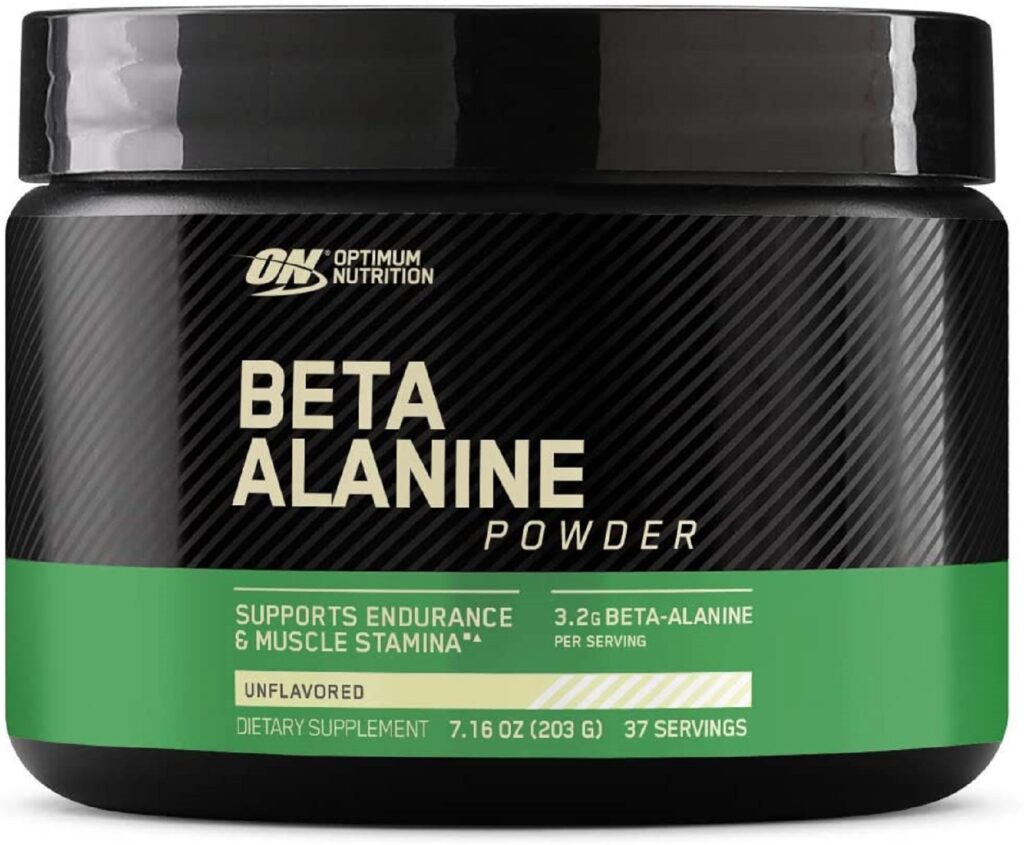We’re itching to tell you about beta-alanine and bodybuilding. It’s gained popularity as a dietary supplement due to its potential benefits in improving physical performance and reducing fatigue. Beta-alanine is a common ingredient in pre-workout blends, noted for giving you an itchy, tingling feeling. Let’s delve into the research surrounding beta-alanine supplementation and its effects on various aspects of exercise performance. We explore the bodybuilding benefits of beta-alanine, while also addressing potential side effects and dosage recommendations for optimal results.
BETA-ALANINE BENEFITS
Increased Muscle Carnosine Levels
Beta-alanine acts as a precursor to carnosine, a dipeptide found abundantly in skeletal muscle. Studies have shown that supplementing with beta-alanine can elevate muscle carnosine levels significantly [1]. In turn, increased carnosine levels are associated with improved exercise performance and muscle endurance [2].
Improved High-Intensity Exercise Performance
Beta-alanine supplementation has been extensively researched for its impact on high-intensity, short-duration activities such as weightlifting, sprinting, and interval training. By buffering the accumulation of lactic acid, beta-alanine helps delay the onset of fatigue and enables individuals to engage in longer and more intense workouts [3].

Enhanced Muscle Endurance
In addition to its impact on high-intensity exercise, beta-alanine has also been found to improve muscle endurance during anaerobic activities. By reducing acidosis in muscles, beta-alanine delays fatigue and enhances overall endurance capacity [4].
Longer Time to Exhaustion
Studies have shown that beta-alanine supplementation extends the time to exhaustion in both aerobic and anaerobic activities. This means individuals can exercise for longer periods before reaching the point of fatigue, leading to improved training adaptations and potential performance gains [5].
Positive Effects on Body Composition
Several studies suggest that beta-alanine supplementation may have a positive impact on body composition. By improving training intensity and volume, beta-alanine may contribute to greater gains in lean muscle mass and potentially aid in reducing body fat.
BETA-ALANINE SIDE EFFECT
Beta-alanine supplementation may cause a harmless side effect known as paresthesia, characterized by tingling or flushing sensations on the skin. The intensity and duration of paresthesia can vary among individuals. While it is not harmful, some individuals may find it uncomfortable. It’s important to note that the tingling feeling does not indicate the effectiveness of beta-alanine or your pre-workout supplement.

BETA-ALANINE SUPPLEMENTATION: THE VERDICT
A meta-analysis of 40 studies concluded “β-alanine had a significant overall effect while subgroup analyses revealed a number of modifying factors.” The most important of those modifying factors was “duration of continuous exercise.” At 1-4 minutes the effect was significant. However, “No effect was shown for exercise protocols lasting under 1 min.” Note that an average 10-rep set lasts about 30 seconds.
So, beta-alanine is valuable for high-rep sets (20 reps or more), circuit training, supersets, giant sets, drop sets, high-intensity cardio, and any exercise performed with maximum effort and minimal rest for more than a continuous minute, from sled-pushing to cycling to MMA fighting and much more. If none of the above applies to you, beta-alanine is an unnecessary supplement. But for most exercisers, beta-alanine is a useful supplement. It’ll help you eke out a couple final reps near the end of a drop set or giant set or keep you sprinting during that final burst of cardio.
Beta-Alanine Dosage Recommendations
To achieve optimal results with beta-alanine supplementation, a loading phase followed by a maintenance phase is recommended. During the loading phase, individuals typically consume 4-6 grams of beta-alanine per day, divided into multiple doses, for a duration of 2-4 weeks. This loading phase helps saturate muscle carnosine levels. After the loading phase, a maintenance dose of 2-3 grams per day is usually sufficient to maintain elevated carnosine levels.
BETA-ALANINE FAQS
What is beta-alanine good for?
It’s good for increasing your strength and endurance when exercising with effort for more than one continuous minute, as when doing high-rep sets, cardio, circuit training, sled-pushing, or MMA fighting.
Can you take beta-alanine every day?
Yes. And you should, especially during the first 2-4 weeks of usage (loading phase).
Can beta-alanine increase testosterone?
Not directly. However, resistance exercise has been shown to increase testosterone, so if you’re exercising more intensely with beta-alanine that may have a minor positive affect on your test levels.
Does beta-alanine affect HGH?
Again, not directly. But more intense exercise with help from beta-alanine may have a minor positive effect on HGH levels.
Should I take beta-alanine on rest days?
Yes. You can take beta-alanine anytime on any day. Though it benefits your workouts, and it’s commonly included in pre-workout supplements, your body will store it throughout the day and on off-days. The only time we would recommend you not take beta-alanine is if you have an extended non-workout period of more than five days.
How often should I take beta-alanine?
Daily.
Why does beta-alanine make you itch?
It triggers certain neurons responsible for initiating a tingling of the skin. This is called paresthesia, and it’s harmless. The paresthesia threshold varies from person to person, so the level of itching experienced may also vary.
How much beta-alanine per day?
4-6 grams daily for the first 2-4 weeks (loading phase), 2-3 grams daily after that.
Does beta-alanine have side effects?
Only paresthesia.
Does beta-alanine increase muscle growth?
Not directly. But beta-alanine can indirectly improve muscle growth by increasing your strength and endurance during prolonged exercises, such as high-rep sets.
Is beta-alanine safe for everyone?
Beta-alanine may interact with some heart medicines and erectile dysfunction drugs. It’s safety has not been established for pregnant or breastfeeding women. Consult with your doctor before using beta-alanine if you have a health concern.
References
1. Stellingwerff, T., Anwander, H., Egger, A., Buehler, T., Kreis, R., & Decombaz, J. (2012), “Effect of two β-alanine dosing protocols on muscle carnosine synthesis and washout,” Amino Acids, 42(6), 2461-2472.
2. Hobson, R. M., Saunders, B., Ball, G., Harris, R. C., & Sale, C. (2012), “Effects of β-alanine supplementation on exercise performance: a meta-analysis,” Amino Acids, 43(1), 25-37.
3. Artioli, G. G., Gualano, B., Smith, A., Stout, J., & Lancha Jr, A. H. (2010), “Role of beta-alanine supplementation on muscle carnosine and exercise performance,” Med Sci Sports Exerc, 42(6), 1162-1173.
4. Derave, W., Everaert, I., Beeckman, S., & Baguet, A. (2007), “Muscle carnosine metabolism and beta-alanine supplementation in relation to exercise and training,” Sports Medicine, 47(7), 135-146.
5. Smith, A. E., Walter, A. A., Graef, J. L., Kendall, K. L., Moon, J. R., Lockwood, C. M., … & Stout, J. R. (2009), “Effects of β-alanine supplementation and high-intensity interval training on endurance performance and body composition in men; a double-blind trial,” Journal of the International Society of Sports Nutrition, 6(1), 5.
We ranked beta-alanine as one of the four best supplements for muscle gain. Read the full article here.
















































